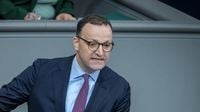On May 5, 2025, Jens Spahn, the former Federal Minister of Health, was elected as the new chairman of the CDU/CSU parliamentary group in the Bundestag, receiving an impressive 91.3 percent of the votes. This significant election result marks a pivotal moment for Spahn, who has been a member of the Bundestag for over 20 years and has held various leadership roles within the party.
During the voting process, a total of 197 votes were cast, with 178 members voting in favor of Spahn, 17 against, and 2 abstentions. After accounting for the abstentions, Spahn's percentage of support remained high at 91.3 percent, while it stood at 90.35 percent when including the abstentions. The CDU and CSU together hold 208 seats in the parliament, indicating a strong backing for Spahn's leadership.
Spahn succeeds Friedrich Merz, who is set to be elected as Chancellor on May 6, 2025. Merz had previously nominated Spahn for this leadership position, alongside CSU leader Markus Söder. In his acceptance speech, Spahn expressed gratitude towards Merz for guiding the Union back into government, highlighting the trust that has developed between them during their collaboration. "We have learned to appreciate each other in our work; the trust is great," Spahn stated, reflecting on their cooperative efforts.
As he steps into this new role, Spahn emphasized the urgency for the newly formed black-red coalition to begin governing effectively without delay. He stated, "There is no grace period for the new government; we must get into governing quickly." This reflects a clear acknowledgment of the challenges ahead as the coalition seeks to address pressing issues facing Germany.
Spahn's leadership will be particularly scrutinized given his past as Health Minister during the COVID-19 pandemic, a role that garnered both experience and criticism. He faced backlash for allegedly purchasing overpriced protective masks, a controversy that has followed him into his new position. Nevertheless, Spahn is determined to position the Union as a "stability factor in turbulent times," aiming to address the needs of the country effectively.
In his remarks, Spahn also reaffirmed the Union's stance against the Alternative for Germany (AfD), a party that has gained notoriety for its far-right positions. He made it clear that the Union has "nothing in common" with the AfD and announced that there would be no recommendation to elect AfD members to committee chairmanships. He asserted, "Good governance is the best weapon against extremists," highlighting his commitment to a principled approach to politics.
Spahn's election comes at a time when the CDU/CSU is looking to redefine its identity and strengthen its position within the German political landscape. His background in economic policy will likely play a crucial role as the coalition navigates economic challenges and seeks to implement effective governance strategies. With the SPD as a coalition partner, Spahn emphasized the importance of working towards common solutions rather than focusing on short-term gains.
As the new chairman, Spahn inherits a significant responsibility, and his leadership will be pivotal in shaping the future of the CDU/CSU parliamentary group. The challenges ahead are formidable, but with strong support from his colleagues and a clear vision for governance, Spahn aims to lead the Union effectively through these tumultuous times.
In summary, Jens Spahn's election as the new chairman of the CDU/CSU parliamentary group represents a critical juncture for the party as it seeks to regain its footing in the German political arena. With a solid majority backing him, Spahn is poised to leverage his experience and address the pressing issues facing the coalition, all while maintaining a clear demarcation from extremist elements in the political landscape.



